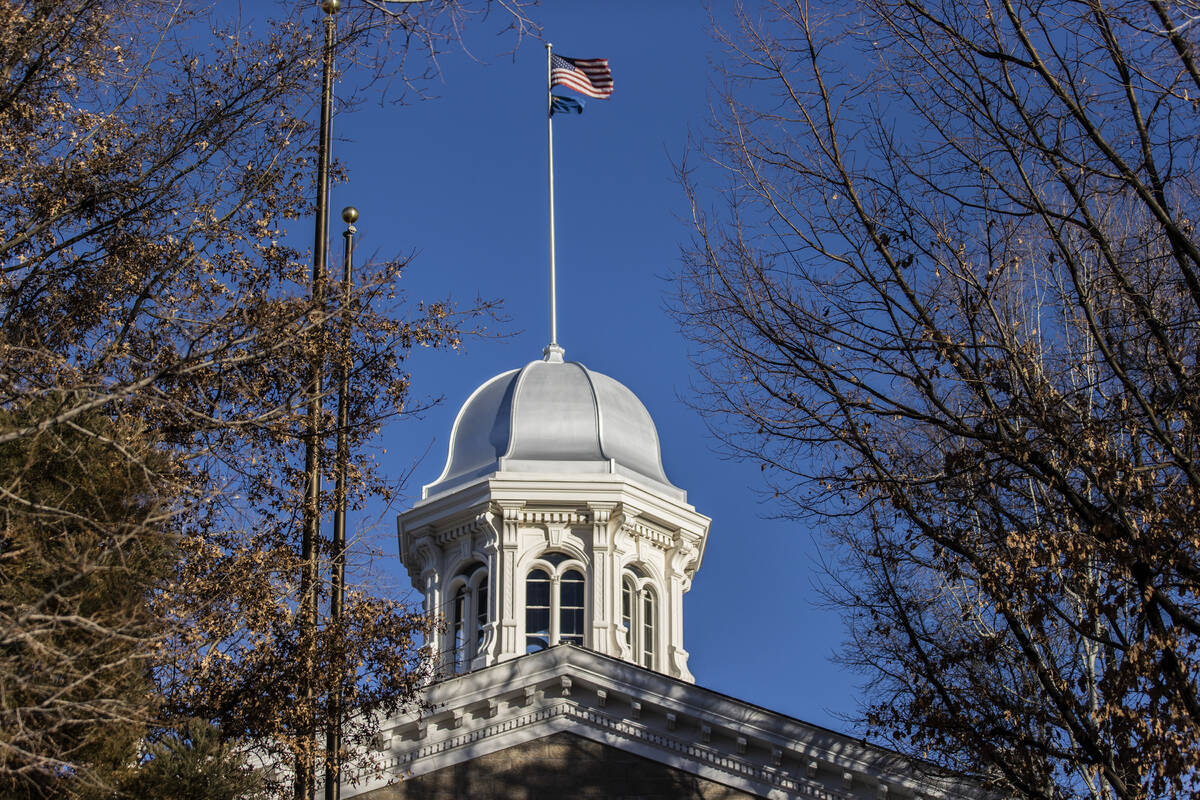No matter when it ends, the 2023 Nevada Legislature will end ugly
CARSON CITY — Every legislative session is different, but they all end ugly.
And if the progress so far is any indication, the end of the 2023 session could be especially ugly.
Consider this: As of last week, Gov. Joe Lombardo has signed fewer bills than of any legislative session in the last 25 years.
According to research compiled by the Legislative Counsel Bureau’s Research Division at the request of the Review-Journal, Lombardo had signed just six bills by May 16, Day 100 of the session. (At week’s end, that number had risen to nine, with three vetoes.)
By the same point in the 2021 session, 14 bills had been signed. But at this point in 1999 — the first session operating under the constitutional 120-day limit — 105 bills had been signed by the governor.
Compounding the situation is the fact that relations between the governor’s office and the legislative branch are tense. Democrats were outraged that Lombardo vetoed three gun bills shortly before a news conference called to tout the measures. And Lombardo’s office is frustrated at the pace of the session and the fact that most of the governor’s top priorities have been ignored in the legislative building.
Thus far, Democratic lawmakers have fully ignored two of Lombardo’s proposals: One on election reforms and another on criminal justice. An education bill has had a hearing, and a school safety bill has even passed the Assembly. But none of the measures had passed both houses as of Friday.
Lawmakers think Lombardo – who served for eight years as the sheriff of Clark County and is used to giving orders and having them obeyed – fails to recognize that the Legislature is a co-equal branch of government not under his purview. But Lombardo’s office thinks lawmakers have failed to recognize that Nevada now has a divided government, with a Republican in the executive mansion.
Add to that the introduction of two major issues in the closing weeks of the session: A massive tax credit plan designed to lure film studios to Southern Nevada and a proposal to build a Major League Baseball stadium for the Oakland Athletics in Las Vegas.
All of this has led many lobbyists to conclude that a special session will be necessary to get the Legislature’s work finished on time.
Closing it down
“We’re not as concerned with the number of bills signed versus the negotiations over the shutdown of the Legislature,” said Ben Kickehefer, chief of staff to Lombardo and a former state senator who served on the pivotal Finance Committee.
Part of the those negotiations: The neglected Lombardo priorities in areas of education (including an expansion of Opportunity Scholarships), a government overhaul bill and a public safety initiative.
For his part, Kieckhefer says the two sides have had discussions over priorities with an eye toward the legislative endgame. (To be sure, Democratic leadership has had breakfast with Lombardo at the governor’s mansion every Wednesday since the session began in February.)
But those talks are hindered, likely because neither side is willing to lay their cards on the table and let the other know what they are willing to do without and what they insist must pass.
That makes moving and amending bills difficult. On Friday, for example, Lombardo issued a news release rejecting a Democratic school safety bill, and legislative leaders agreed to grant Lombardo’s version of the legislation an exemption from deadlines.
One veteran lobbyist offered a stark prescription: “Who cares if any bills pass? Just pass the budget and go home,” he said. Each side would lose in that scenario, as neither would get any of the policy initiatives they’ve labored over for four months.
Lombardo’s team has an answer for that, however: “He (the governor) has told them directly that he’s prepared to veto the budget,” Kieckhefer said.
After that quote was made public last week, Democrats delighted in pointing to a Review-Journal story from January in which Lombardo said he wouldn’t use the “big hammer of a veto” to force lawmakers to approve school choice legislation, but would try communication and compromise.
To be sure, Kieckhefer himself has said that getting a balanced budget from the 2023 session is the “single most important thing” that could come out of the session, even if no policy bills pass.
Kieckhefer insists Lombardo understands what’s at stake, but is frustrated at the lack of progress on policy measures: “The governor fully understands the dynamics of working in a government structure where there are separate but equal branches of government,” he said. “They (the Legislature) don’t get everything they want, and the governor doesn’t get to get everything he wants, either.”
Changing dynamics
If Lombardo does veto the budget, a special session would be necessary, and sooner rather than later. (The state is funded through June 30, the end of the fiscal year. After that, the Nevada version of a government shutdown would ensue.)
If a special session were to be necessary, however, the dynamics would shift completely. Unlike the 120-day legislative session, where the majority party sets the agenda by deciding what bills to hear and what bills to pass, the governor has the exclusive power to set the special session agenda. He could pepper it with issues that he cares about, using the budget veto as a cudgel.
Another complicating factor was state Senate Majority Leader Nicole Cannizzaro’s pregnancy. She was due to have her second child, a boy, shortly after the session adjourned in June, but Cole Nathan Joseph Cannizzaro-Ring arrived early on Saturday, the senator reported on Facebook. But working during a pregnancy is nothing new for Cannizzaro; she was pregnant during the 2021 Legislature as well.
For Democrats — who have held back many bills that they want to see passed — waiting until the end of session might be strategic. A longtime Carson City lobbyist notes that bills vetoed by the governor after the Legislature adjourns will return to the next session, slated for 2025. By then, Democrats might have something they currently lack: a two-thirds majority in both houses, instead of just the Assembly. In that event, they could override Lombardo vetoes and pass other measures over his objections.
For the most part, the budget is finished, and it mostly reflects the spending plan that Lombardo presented to lawmakers after his State of the State speech in January. That leaves the next two weeks for lawmakers to maneuver on policy issues before the midnight deadline on June 5.
History of special sessions
Before voters overwhelmingly approved the ballot question limiting regular sessions of the Legislature to 120 days in 1998, sessions could stretch on for weeks into the summer. Since then, about half the sessions have required at least one special session to complete legislative business.
The 1999 session wrapped up on time, but sessions in 2001, 2003, 2005, 2007, and 2013 all went into overtime. The 2003 session was especially contentious, as a fight over taxes led to lawsuits and two special sessions that only ended when a single recalcitrant Republican lawmaker agreed to vote for a tax package, providing the final vote to reach the required two-thirds threshold.
Since 2015, no immediate post-session special session has been necessary to complete unfinished business, although special sessions have been called for other reasons during the last 25 years.
Under the law, special sessions called by the governor are limited to 20 days, although the governor could call another session by signing a subsequent proclamation. The constitution also allows for the Legislature to call itself into special session – which would supersede even a session called by the governor – but that requires a two-thirds supermajority to sign a petition, which Democrats currently lack in the state Senate.
There are some in Carson City who don’t see a special session as inevitable, and some say that things often look bleak as the session comes to a close, only to resolve with a race to the finish at the end.
But both sides also say they’re not afraid of going to a special, even with the shift in power dynamics that would result between the two branches. Part of that is surely the posturing of two adversaries unwilling to show weakness, since a lengthy standoff is something neither first-term, first-session governor Lombardo nor Democratic leaders in the Legislature wants.
Because that end would surely be ugly.
Contact Steve Sebelius at SSebelius@reviewjournal.com or 702-383-0253. Follow @SteveSebelius on Twitter.
This story has been updated to reflect the fact that Senate Majority Leader Nicole Cannizzaro gave birth to her second child on Saturday.



















